 Marine
reserves prohibit fishing and thus protect from these kinds of threats,
but there are many and much larger threats for which they offer no protection
at all, like hurricanes, oil spills, chemical poisons, global warming,
poisonous plankton blooms and above all, run-off from the land. Marine
reserves prohibit fishing and thus protect from these kinds of threats,
but there are many and much larger threats for which they offer no protection
at all, like hurricanes, oil spills, chemical poisons, global warming,
poisonous plankton blooms and above all, run-off from the land.
In a short period of less than 20 years, degradation
from land-based pollution has become the sea's number one problem. Quite
unintuitively the seemingly harmless mud from the land causes so much harm
in the sea. As rains become more intensive, and their rain drops increase
in size, the devastating effects accelerate entirely beyond our wildest
anticipation. Double the size of a rain drop, and the damage done to the
sea will increase 30-100 fold, due to the combined effects of mass,
velocity,
volume,
concentration,
sea
area soiled and persistence! The fine component of mud is clay,
which locks up the fertility of the land, releasing it to the sea. Thus
the coastal seas become overfertilised, resulting in dense plankton blooms
which kill usually slowly but sometimes fast as some are extremely poisonous.
The bottom line? Marine reserves do not protect against the sea's foremost
threat. They no longer work.
We must save the land in order to save
the sea! |
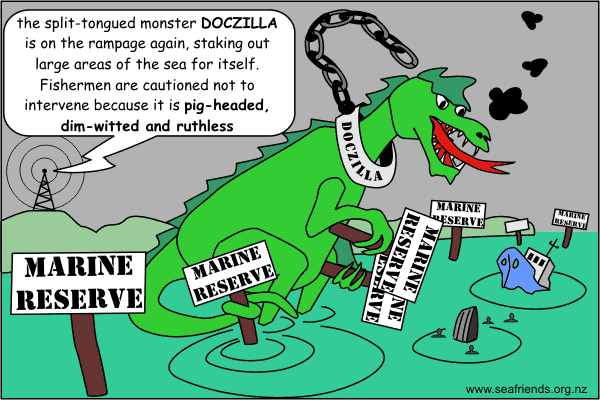 Could
there be a similarity in behaviour between DOC (the Department of Conservation
in New Zealand) and a Jurassic monster like Godzilla (Size does
matter)? Many believe there is. Driven by a handful of ideologists, DoC
has given itself the mandate to usurp large parts of the sea for no-take
permanent marine reserves. A land-based organisation taking control of
the sea does not fit well with fishermen who are the only ones to lose
out, without compensation. Ideally, we all want the best future for our
children, and the reduction in fish stocks has caused concern. But isolated
protected enclaves in the sea are not going to fix these problems. If DoC
had a strong case, reason would ultimately prevail, but the 17 (or so)
coastal marine reserves do not work since they are degrading, losing both
quality
and quantity of life. They are unsustainable and do not protect
biodiversity. Yet DoC pushes ahead, obtuse to facts and reason, much like
a Jurassic monster would. Do we really need more failing marine reserves?
Could
there be a similarity in behaviour between DOC (the Department of Conservation
in New Zealand) and a Jurassic monster like Godzilla (Size does
matter)? Many believe there is. Driven by a handful of ideologists, DoC
has given itself the mandate to usurp large parts of the sea for no-take
permanent marine reserves. A land-based organisation taking control of
the sea does not fit well with fishermen who are the only ones to lose
out, without compensation. Ideally, we all want the best future for our
children, and the reduction in fish stocks has caused concern. But isolated
protected enclaves in the sea are not going to fix these problems. If DoC
had a strong case, reason would ultimately prevail, but the 17 (or so)
coastal marine reserves do not work since they are degrading, losing both
quality
and quantity of life. They are unsustainable and do not protect
biodiversity. Yet DoC pushes ahead, obtuse to facts and reason, much like
a Jurassic monster would. Do we really need more failing marine reserves? Marine
reserves prohibit fishing and thus protect from these kinds of threats,
but there are many and much larger threats for which they offer no protection
at all, like hurricanes, oil spills, chemical poisons, global warming,
poisonous plankton blooms and above all, run-off from the land.
Marine
reserves prohibit fishing and thus protect from these kinds of threats,
but there are many and much larger threats for which they offer no protection
at all, like hurricanes, oil spills, chemical poisons, global warming,
poisonous plankton blooms and above all, run-off from the land.
 As
a rule, the top predators are much fewer in number and biomass than their
prey. They also grow larger, older and wiser. With their larger brains
and longer life experiences, they patrol large territories while varying
their diets. Not surprisingly, the hunters among them are also scavengers,
feeding from dead animals. This pitches them rather unfairly against fishermen,
resulting in them being threatened far more than their prey (up to 100
times more due to longer life expectancy, lower biomass,
late
fecundity and high curiosity). It is hoped that marine reserves,
if these are large enough, would give them a fairer chance, and this has
been borne out by scientific studies worldwide. There is a cost, however
in having to feed large predators, resulting in less fish overall inside
a reserve and thus a lower survival chance for prey fish, the subject of
this cartoon. On the practical side, large predators such as groupers have
not returned to either Goat Island or the Poor Knights, even after a quarter
century of protection. Obviously, there is something amiss, but in a world
where humans push nature aside, the main question remains: Do we need
marine reserves just to save big predators?
As
a rule, the top predators are much fewer in number and biomass than their
prey. They also grow larger, older and wiser. With their larger brains
and longer life experiences, they patrol large territories while varying
their diets. Not surprisingly, the hunters among them are also scavengers,
feeding from dead animals. This pitches them rather unfairly against fishermen,
resulting in them being threatened far more than their prey (up to 100
times more due to longer life expectancy, lower biomass,
late
fecundity and high curiosity). It is hoped that marine reserves,
if these are large enough, would give them a fairer chance, and this has
been borne out by scientific studies worldwide. There is a cost, however
in having to feed large predators, resulting in less fish overall inside
a reserve and thus a lower survival chance for prey fish, the subject of
this cartoon. On the practical side, large predators such as groupers have
not returned to either Goat Island or the Poor Knights, even after a quarter
century of protection. Obviously, there is something amiss, but in a world
where humans push nature aside, the main question remains: Do we need
marine reserves just to save big predators?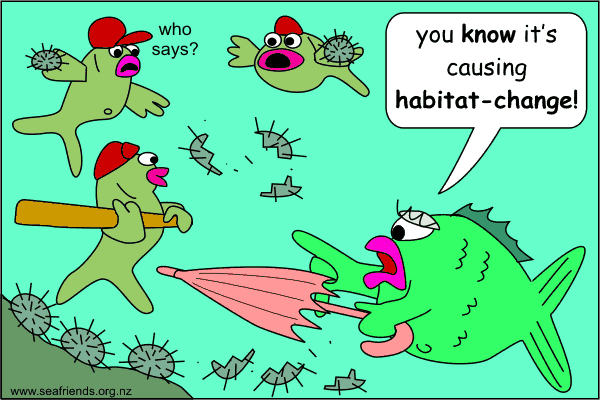 DoC
and some scientists are popularising the hypothesis that fishermen cause
underwater habitats to change - by catching the large fish who also
eat sea-urchins. The urchins then become more numerous, eating more kelp.
There will be less kelp and more grazed habitat which is called urchin
barrens. It is a logical although simplified consequence of (perceived)
top-down ecological interaction between populations. In California a scientist
observed that where the sea otter was hunted, the tall kelp also disappeared.
The increase in sea urchins connected these observations but it could not
be verified by others.
DoC
and some scientists are popularising the hypothesis that fishermen cause
underwater habitats to change - by catching the large fish who also
eat sea-urchins. The urchins then become more numerous, eating more kelp.
There will be less kelp and more grazed habitat which is called urchin
barrens. It is a logical although simplified consequence of (perceived)
top-down ecological interaction between populations. In California a scientist
observed that where the sea otter was hunted, the tall kelp also disappeared.
The increase in sea urchins connected these observations but it could not
be verified by others.
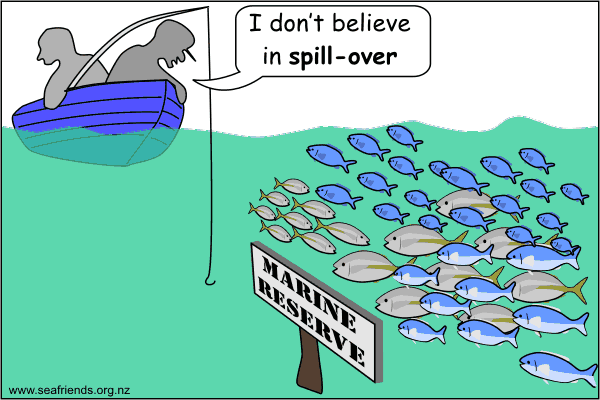 Marine
reserves have no borders, allowing fish to move freely in and out. Nearly
all commercially fished species belong to the large monotonous habitats
of sandy and muddy sea bottom and open water, and these fish migrate
through
marine reserves. So marine reserves have little meaning for them. Scientists
have seen (resident) fish inside marine reserves become more numerous and
somewhat larger too. It means that the density inside is higher than outside,
and resident fish will spill out as they search for larger unoccupied territories.
However, this effect is very small as confirmed by measurement (10%) as
most die of natural causes (like predation) inside reserves. In fact, in
good marine reserves one does not want breeding stock to spill out, and
this can be achieved by making them large, and with boundaries following
natural habitat boundaries. The bottom line is that the benefit of spillover
is FAR LESS than the lost fishery inside the marine reserve and that this
cost must always be weighed against proven benefits. We have large
unfished areas in the sea, such as cable ways, known as de-facto marine
reserves but these have not been studied for their benefits. Should
we have more marine reserves before these de-facto marine reserves have
been studied?
Marine
reserves have no borders, allowing fish to move freely in and out. Nearly
all commercially fished species belong to the large monotonous habitats
of sandy and muddy sea bottom and open water, and these fish migrate
through
marine reserves. So marine reserves have little meaning for them. Scientists
have seen (resident) fish inside marine reserves become more numerous and
somewhat larger too. It means that the density inside is higher than outside,
and resident fish will spill out as they search for larger unoccupied territories.
However, this effect is very small as confirmed by measurement (10%) as
most die of natural causes (like predation) inside reserves. In fact, in
good marine reserves one does not want breeding stock to spill out, and
this can be achieved by making them large, and with boundaries following
natural habitat boundaries. The bottom line is that the benefit of spillover
is FAR LESS than the lost fishery inside the marine reserve and that this
cost must always be weighed against proven benefits. We have large
unfished areas in the sea, such as cable ways, known as de-facto marine
reserves but these have not been studied for their benefits. Should
we have more marine reserves before these de-facto marine reserves have
been studied?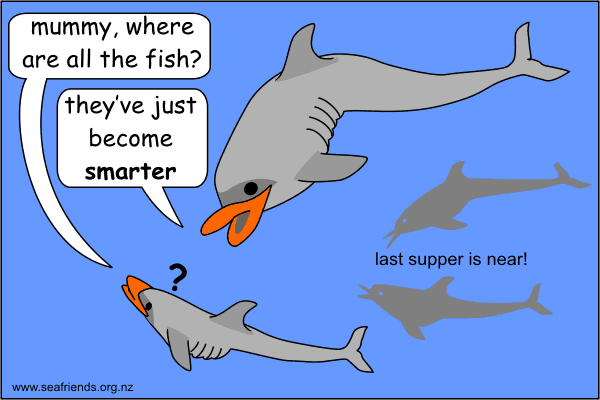 Fishermen
think, as they become less successful that the fish are still there but
that they have just become smarter. The reality is that fish are harder
to catch when their stocks are down. Predators like dolphins are disadvantaged
because they have no cheap fossil fuel at their disposal, as they live
in the balance between energy gained from food and energy spent
on finding it. The laws governing the economics of exploitation
are harsh for them, resulting in dolphins spending most of their time searching
and hunting, leaving little for recuperating and playing. We see fewer
dolphins and within their groups, fewer calves. What does that tell us?
What chance does a Hector's Dolphin have?
Fishermen
think, as they become less successful that the fish are still there but
that they have just become smarter. The reality is that fish are harder
to catch when their stocks are down. Predators like dolphins are disadvantaged
because they have no cheap fossil fuel at their disposal, as they live
in the balance between energy gained from food and energy spent
on finding it. The laws governing the economics of exploitation
are harsh for them, resulting in dolphins spending most of their time searching
and hunting, leaving little for recuperating and playing. We see fewer
dolphins and within their groups, fewer calves. What does that tell us?
What chance does a Hector's Dolphin have?
 Locking
up large parts of the sea (the Greens and Forest&Bird want 20-30%)
is too important a decision to be made by decree. It so happens that the
majority in government have little knowledge of the sea, and they are easily
misled by feel-good arguments that make no economical or ecological sense.
The sea is an important resource and is easy to get to, as opposed to our
National Parks, which essentially cover our wastelands. So we cannot base
our reasoning on our knowledge of the land. The sea is simply too different.
Locking
up large parts of the sea (the Greens and Forest&Bird want 20-30%)
is too important a decision to be made by decree. It so happens that the
majority in government have little knowledge of the sea, and they are easily
misled by feel-good arguments that make no economical or ecological sense.
The sea is an important resource and is easy to get to, as opposed to our
National Parks, which essentially cover our wastelands. So we cannot base
our reasoning on our knowledge of the land. The sea is simply too different.
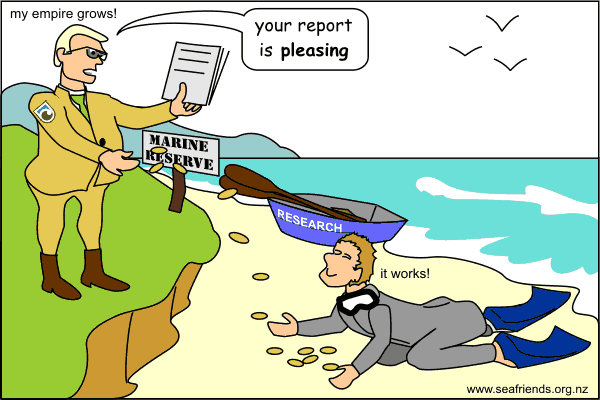 A
small country like New Zealand cannot afford to spend lavishly on research
funding, so funds need to be targeted wisely. On the one hand, leaving
scientists entirely free to decide for themselves what to study, can lead
to unaccountable practices but also to fundamental research which could
return dividends in a distant future. On the other hand, targeting funds
to our immediate needs, would improve accountability but can result in
short-term divided projects that do not add to our fundamental understanding
of nature. Out of necessity, all funds originating from the taxpayer are
funnelled through bureaucracies to the recipient scientists. One such funnel
is the Department of Conservation.
A
small country like New Zealand cannot afford to spend lavishly on research
funding, so funds need to be targeted wisely. On the one hand, leaving
scientists entirely free to decide for themselves what to study, can lead
to unaccountable practices but also to fundamental research which could
return dividends in a distant future. On the other hand, targeting funds
to our immediate needs, would improve accountability but can result in
short-term divided projects that do not add to our fundamental understanding
of nature. Out of necessity, all funds originating from the taxpayer are
funnelled through bureaucracies to the recipient scientists. One such funnel
is the Department of Conservation.
 Marine
reserves are places in the sea where fishing is stopped forever but where
other threats remain. Poisonous plankton blooms, caused by overfertilised
seas, are responsible for profound fish kills (1973, 1983, 1992-4, 2001-3).
Marine reserves of course do not prevent or fix this. But the finer points
of this argument are that some scientists believe that somehow a marine
reserve is in a better state to survive such threats, and also the threat
from land-based pollution. They say that because a reserve is more balanced,
it also functions better and is therefore more resilient to external
shocks. Experimental proof is of course absent, but even ecological principles
weigh against this argument. For instance, the top predators in the food
pyramid, the ones we catch, have no measurable influence on the quantity
and quality of the plankton, where the problems come from. It is just
too easy to overestimate the perceived benefits of marine reserves.
Marine
reserves are places in the sea where fishing is stopped forever but where
other threats remain. Poisonous plankton blooms, caused by overfertilised
seas, are responsible for profound fish kills (1973, 1983, 1992-4, 2001-3).
Marine reserves of course do not prevent or fix this. But the finer points
of this argument are that some scientists believe that somehow a marine
reserve is in a better state to survive such threats, and also the threat
from land-based pollution. They say that because a reserve is more balanced,
it also functions better and is therefore more resilient to external
shocks. Experimental proof is of course absent, but even ecological principles
weigh against this argument. For instance, the top predators in the food
pyramid, the ones we catch, have no measurable influence on the quantity
and quality of the plankton, where the problems come from. It is just
too easy to overestimate the perceived benefits of marine reserves.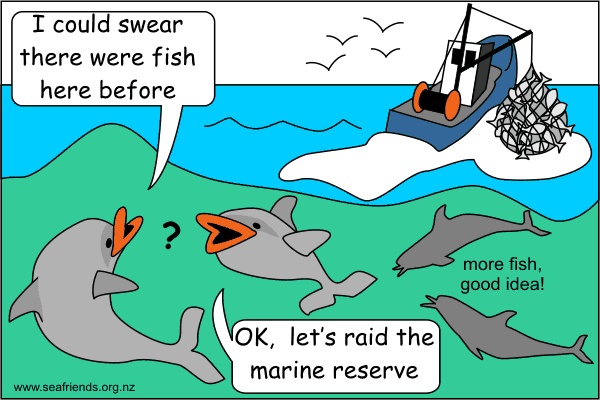 People
are incredibly smart at making technology (= knowledge used to advantage)
work for them. It has given us such great advantage over the natural top
predators (shark, dolphin, orca, seal, sea lion) that we are able to fish
their prey stocks down to less than 10 percent. At such stocking levels,
the natural top predators cannot survive. But they too use knowledge to
advantage, and we should not be surprised that they will remember where
fish abound, such as inside hot spots and marine reserves. We have
witnessed a graphic demonstration of this at the Poor Knights' Northern
Arch where short-tailed stingrays congregated up to 50 at a time - until
the orcas discovered them and since then, kept stingray numbers well down.
The
strong message is that we must leave more fish in the sea.
People
are incredibly smart at making technology (= knowledge used to advantage)
work for them. It has given us such great advantage over the natural top
predators (shark, dolphin, orca, seal, sea lion) that we are able to fish
their prey stocks down to less than 10 percent. At such stocking levels,
the natural top predators cannot survive. But they too use knowledge to
advantage, and we should not be surprised that they will remember where
fish abound, such as inside hot spots and marine reserves. We have
witnessed a graphic demonstration of this at the Poor Knights' Northern
Arch where short-tailed stingrays congregated up to 50 at a time - until
the orcas discovered them and since then, kept stingray numbers well down.
The
strong message is that we must leave more fish in the sea. The
main enemy of the organisms attached to the rock face, is a potent mixture
of dust, bacteria and decaying plankton organisms, raining from above as
a result of the sea becoming murkier. It suffocates those animals filtering
the water for food, like sponges and seasquirts while it infects with disease-bacteria
those with delicate skins such as bryozoa, anemones, corals, hydroids and
gorgonean fans. This threat to life is particularly large in calm places
such as inside caves and in deeper water. But even here some organisms
can be found that provide a cleaning service, such as some snails, hermit
crabs, various starfish and sea cucumbers. Fish like the plant eating parore
and the little triplefins living on the rock face, also provide a cleaning
service but in the end, the threat wins. Only by saving the land can
we save the sea!
The
main enemy of the organisms attached to the rock face, is a potent mixture
of dust, bacteria and decaying plankton organisms, raining from above as
a result of the sea becoming murkier. It suffocates those animals filtering
the water for food, like sponges and seasquirts while it infects with disease-bacteria
those with delicate skins such as bryozoa, anemones, corals, hydroids and
gorgonean fans. This threat to life is particularly large in calm places
such as inside caves and in deeper water. But even here some organisms
can be found that provide a cleaning service, such as some snails, hermit
crabs, various starfish and sea cucumbers. Fish like the plant eating parore
and the little triplefins living on the rock face, also provide a cleaning
service but in the end, the threat wins. Only by saving the land can
we save the sea!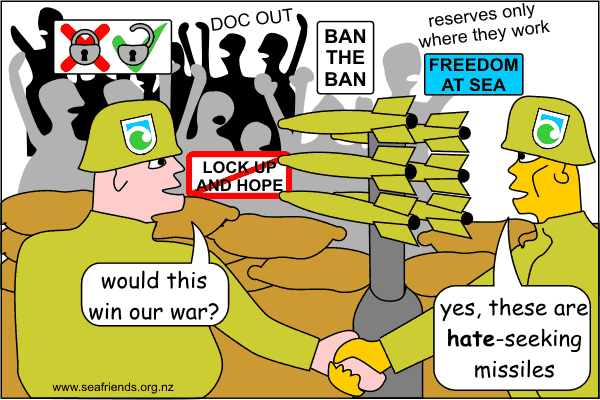 A
situation as depicted seems to belong only to remote foreign dictatorial
states, yet a striking similarity exists with what is happening in some
civilised societies like New Zealand. Driven by an ideology with little
foundation, a government department has somehow lost the plot. Whereas
we may be forgiven to think that bureaucrats are public servants and their
departments accountable to the public, this may not always be the case.
Employing the tactics of secrecy, surprise, confrontation, deceit and propaganda,
some well-funded departments are riding rough-shod over the poorly funded
populace, ignoring the foundations of democracy, consultation and education.
In the process they create hate and desperation which can lead to ugly
scenes. Should this be condoned? Is this the way towards a better
future for our children?
A
situation as depicted seems to belong only to remote foreign dictatorial
states, yet a striking similarity exists with what is happening in some
civilised societies like New Zealand. Driven by an ideology with little
foundation, a government department has somehow lost the plot. Whereas
we may be forgiven to think that bureaucrats are public servants and their
departments accountable to the public, this may not always be the case.
Employing the tactics of secrecy, surprise, confrontation, deceit and propaganda,
some well-funded departments are riding rough-shod over the poorly funded
populace, ignoring the foundations of democracy, consultation and education.
In the process they create hate and desperation which can lead to ugly
scenes. Should this be condoned? Is this the way towards a better
future for our children?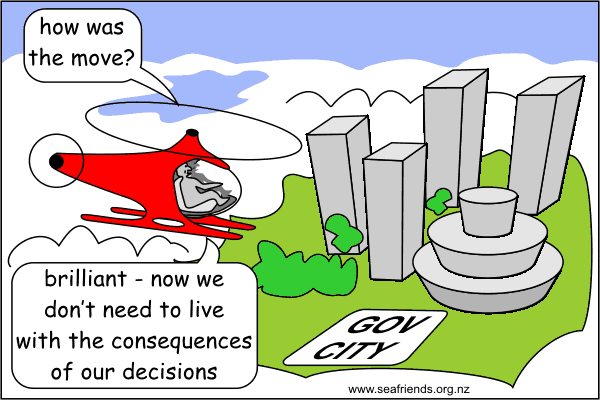 Government
is an uneasy mix of doing what's right for other people, self-preservation,
the climb for power and accumulating perquisites, with its own mannerism
and seclusion. It can conveniently be thought of as having one's snout
in the state's trough, funded by the public's taxes. Decisions are made
far away from where the problems arise, and their solutions, dressed up
in the niceties of Law, seem arcane. In subtle ways the decision makers
are shielded from the costs of their decisions and how these affect people.
It is as if they live in thin air, high on mountain tops, the subject of
this cartoon. Politicians, law makers and policy makers have little touch
with reality or the hand that feeds. As a result, many decisions are made
without thinking the problems through, which leaves an unaffordable legacy
for our children, particularly when it relates to the strange environment
of the sea. Isn't it time for a moratorium on marine reserves? Are you
prepared to learn more to become an informed conservationist?
Government
is an uneasy mix of doing what's right for other people, self-preservation,
the climb for power and accumulating perquisites, with its own mannerism
and seclusion. It can conveniently be thought of as having one's snout
in the state's trough, funded by the public's taxes. Decisions are made
far away from where the problems arise, and their solutions, dressed up
in the niceties of Law, seem arcane. In subtle ways the decision makers
are shielded from the costs of their decisions and how these affect people.
It is as if they live in thin air, high on mountain tops, the subject of
this cartoon. Politicians, law makers and policy makers have little touch
with reality or the hand that feeds. As a result, many decisions are made
without thinking the problems through, which leaves an unaffordable legacy
for our children, particularly when it relates to the strange environment
of the sea. Isn't it time for a moratorium on marine reserves? Are you
prepared to learn more to become an informed conservationist?